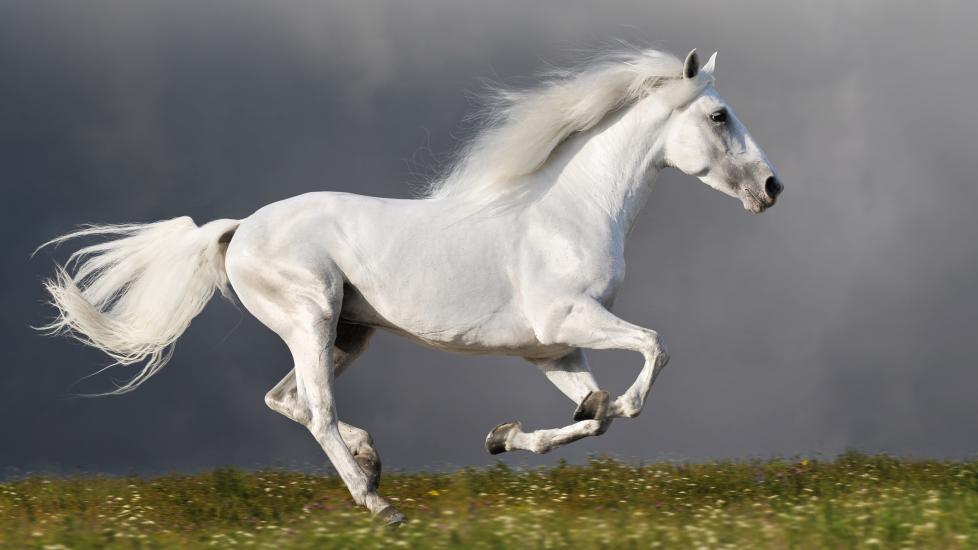How Fast Can a Horse Run?
vikarus/iStock / Getty Images Plus via Getty Images
How Anatomy Affects Horse Speed
Horses are prey animals that evolved to live primarily in grasslands, since they eat hay and forage. A grassland herbivore’s best strategy for survival is to outrun
Horse speed is determined by two primary factors: stride rate and stride length. A horse’s lower legs have a single toe ending in a hoof. Longer limb length allows for longer stride length.
When running at their fastest gait—the gallop—horses have, at most, two hooves in contact with the ground at a time. Each stride involves two “suspension phases,” where no limbs are in contact with the ground. The phases of a horse’s galloping stride are:
-
Hind legs throw the horse’s weight forward
-
Abdominal muscles contract to allow for a moment of suspension
-
Front legs absorb the horse’s weight as they land
Fastest Horse Breeds
Recent research tracing the ancient equine genome shows that, over time, humans have increasingly selected for speed when breeding horses. These efforts contributed to the development of three horse breeds known for their speed.
Thoroughbred racehorses can run almost 44 miles per hour over a short distance, and average 38 miles per hour over typical race distances.
Thoroughbred races are measured in furlongs. One furlong is 201.2 meters. The “classic distance” for Thoroughbred racing is eight furlongs (one mile), while the famed Kentucky Derby is 10 furlongs (1.25 miles).
American Quarter Horses were
Arabian horses were traditionally owned by nomads who traveled long distances in desert climates. The horses were selected for their ability to run at moderate speed for many miles.
Today, Arabian horses dominate the sport of endurance riding, where race lengths range from 25 to 100 miles. Endurance rides take place on natural trails, not racetracks.
What Is the Top Speed for a Horse?
A Thoroughbred filly named Winning Brew currently holds the Guinness Book World Record for highest race speed recorded over two furlongs. Winning Brew ran two furlongs in 20.57 seconds, breaking the previous record of 20.68 seconds, set in 2005 by an American Quarter horse, A Long Goodbye.
You might assume horses can run faster without riders. However, some research suggests that, by moving their own bodies in rhythm with their horses’ stride, highly skilled jockeys actually help propel their horses forward.
Sprinting racehorses with jockeys have been clocked running as fast as 43–55 miles per hour for very brief periods, but top galloping speeds of 25–35 miles per hour are more typical
How Far Can a Horse Run and for How Long?
Horses can run at absolute top speed for only a few seconds at a time. However, at moderate speeds, elite endurance horses can travel up to 100 miles or more in 24 hours.
On a flat course with no natural obstacles, the world record at the 100-mile distance is held by an Arabian gelding named Jayhal Shazal, who ran 100 miles in five hours, 45 minutes, and 44 seconds.
Left to their own devices, horses rarely run for very long. When escaping a predator, wild horses stop running as soon as it is safe to do so. Horses running for play usually alternate running with other forms of roughhousing, such as playful nipping.
When running at their fastest gait—the gallop—horses have, at most, two hooves in contact with the ground at a time.
Under pressure from humans,
Horse Running FAQs
How fast can a racing horse run?
The world record for a racing horse running a quarter mile is just under 44 miles per hour. Thoroughbred racehorses average about 38 miles per hour overall while racing.
How fast can a Quarter Horse run?
One Quarter Horse briefly reached a peak speed of 55 miles per hour while completing a quarter-mile race.
How long can a horse run at full speed?
Horses can run at full speed for only a few seconds at a time.
References
Librado, P., Khan, N., Fages, A. et al. The origins and spread of domestic horses from the Western Eurasian steppes. Nature 598, 634–640 (2021). https://doi.org/10.1038/s41586-021-04018-9
Vergara-Hernandez FB, Nielsen BD, Robison CI, et al. Average stride length and stride rate of Thoroughbreds and Quarter Horses during racing. Transl Anim Sci. 2021;6(1):txab233. Published 2021 Dec 28. doi:10.1093/tas/txab233
Sandes D. Evolution driving improvements in racehorse speed, study shows. News. Published June 2, 2023. Accessed February 11, 2024. https://news.exeter.ac.uk/faculty-of-environment-science-and-economy/evolution-driving-improvements-in-racehorse-speed-study-shows/
Bower, M., McGivney, B., Campana, M. et al. The genetic origin and history of speed in the Thoroughbred racehorse. Nat Commun 3, 643 (2012). https://doi.org/10.1038/ncomms1644
Fages A, Hanghøj K, Khan N, et al.
Tracking Five Millennia of Horse Management with Extensive Ancient Genome Time Series. Cell. 2019;177(6):1419-1435.e31. doi:https://doi.org/10.1016/j.cell.2019.03.049
Designed for Running. vanat.cvm.umn.edu. http://vanat.cvm.umn.edu/run/
Mazan M. Equine exercise physiology—challenges to the respiratory system. Animal Frontiers. 2022;12(3):15-24. doi:https://doi.org/10.1093/af/vfac035
Equibase.com. Published 2024. Accessed February 11, 2024. https://www.equibase.com/newfan/pointsofcall.cfm
Fastest speed for a race horse. Guinness World Records. https://www.guinnessworldrecords.com/world-records/fastest-speed-for-a-race-horse
World-record holder aims to validate status in Challenge. ESPN.com. Published November 5, 2005. Accessed February 11, 2024. https://www.espn.com/sports/horse/columns/story?id=2214965
Bloodhorse.com. Published 2024. Accessed February 11, 2024. https://www.bloodhorse.com/horse-racing/articles/141928/mandurah-sets-world-record-for-mile-on-turf
Equibase.com. Published 2023. https://www.equibase.com/content/northamericanrecords.cfm
Pfau T, Spence A, Starke S, Ferrari M, Wilson A. Modern Riding Style Improves Horse Racing Times. Science. 2009;325(5938):289-289. doi:https://doi.org/10.1126/science.1174605
Al Beloushi rewrites world record in Dubai Crown Prince Endurance Cup. gulfnews.com. Published March 21, 2010. Accessed February 11, 2024. https://gulfnews.com/sport/horse-racing/al-beloushi-rewrites-world-record-in-dubai-crown-prince-endurance-cup-1.6007
Facts and Figures – The Tevis Cup. teviscup.org. Accessed February 11, 2024. https://teviscup.org/the-ride/facts-and-figures
